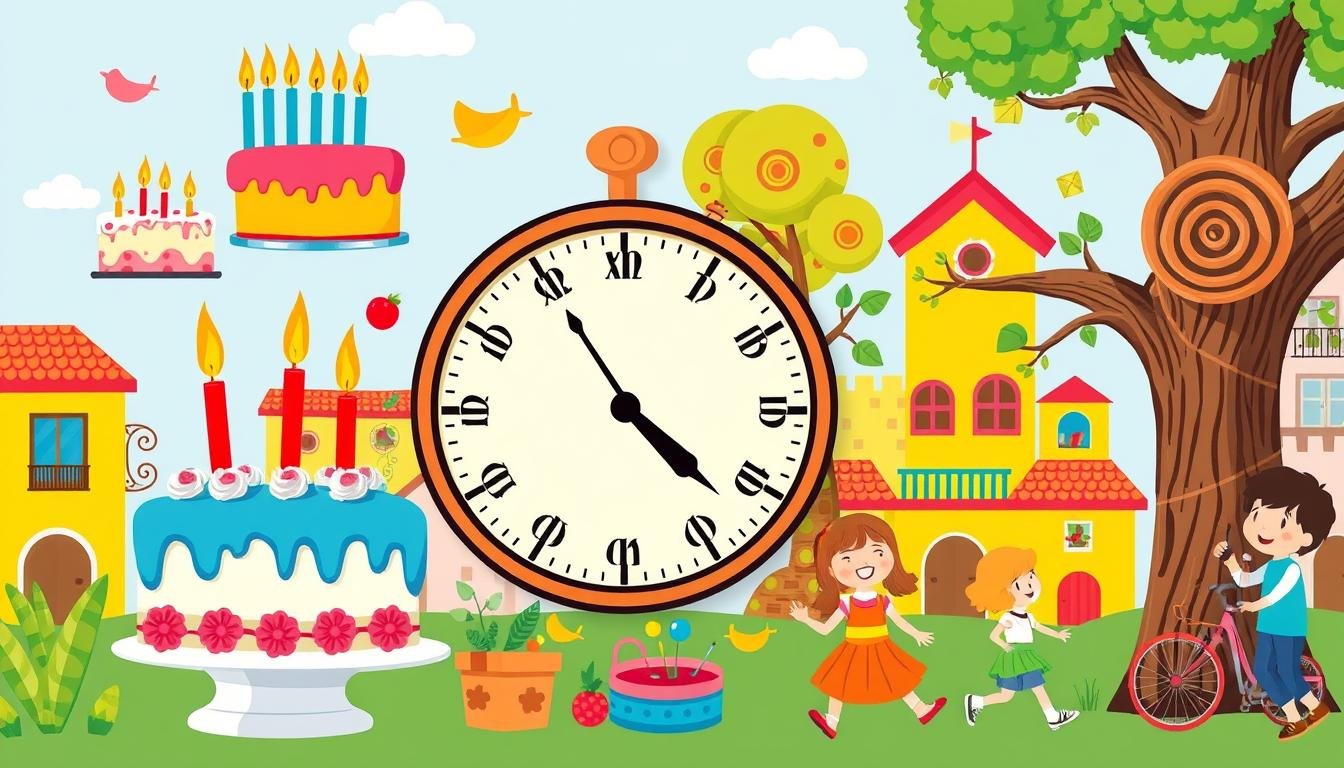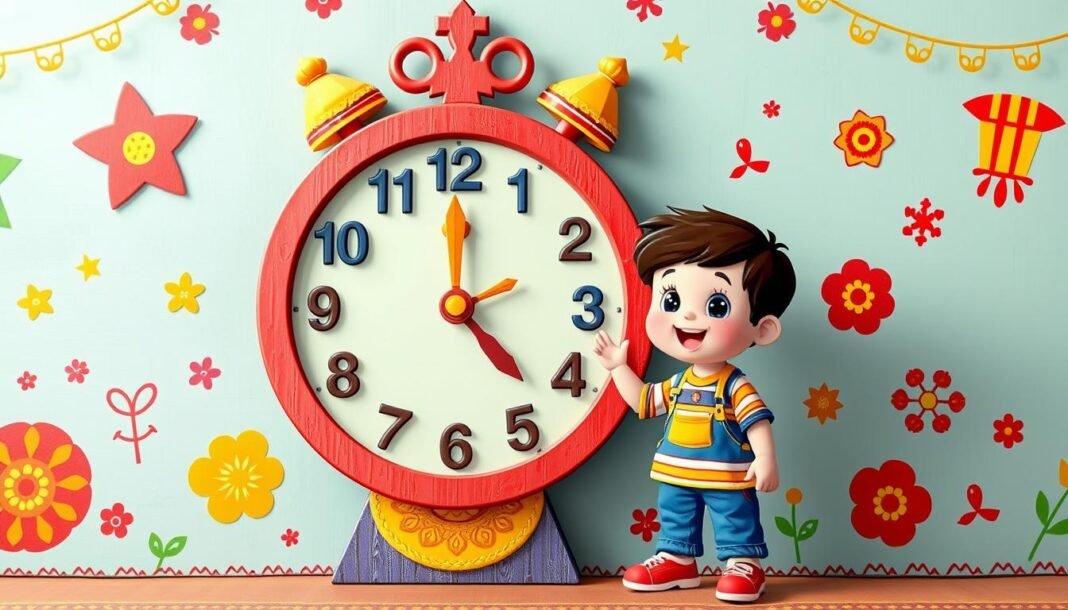Learn to talk about age in Spanish with ease. This guide covers everything from cultural context to proper pronunciation.
A colorful, artistic representation of a Spanish-speaking child standing next to a large, vibrant clock, surrounded by playful numbers and symbols, illustrating the concept of age and time in a lively and engaging manner. The background features elements of Spanish culture, such as traditional patterns and motifs, creating an inviting atmosphere that captures the essence of learning how to ask about age in Spanish.
Discussing age is key for building connections in Spanish-speaking countries. Let’s explore the essential vocabulary and expressions for age-related conversations.
We’ll also look at the etiquette around age in Spanish culture. This knowledge will help you navigate social situations with confidence.
Understanding the Question: “How Old Are You?”
In Spanish-speaking cultures, asking about age is common and acceptable. Age is seen as an essential social identifier. It can provide insight into a person’s life stage and experiences.
Age-related questions start conversations and show interest in others. They help gauge appropriate behavior and etiquette in Hispanic cultures.
Unlike in English-speaking countries, asking how old you are in Spanish is polite. This stems from respecting elders and acknowledging life journeys in Spanish-speaking societies.
When asking for a Spanish-age inquiry, consider the context and relationship. It’s more appropriate for older people to ask younger ones.
The tone and phrasing of the question matter, too. They can show respect and consideration.
Understanding age-related questions in Spanish contexts is essential. It helps you navigate conversations and build stronger connections.
Basic Translation: “How Old Are You?” in Spanish
“¿Cuántos años tienes?” is Spanish for “How old are you?”. It literally means, “How many years do you have?”
This phrase works in casual and formal settings. In very formal situations, “¿Cuál es su edad?” is used.
Some regions have different ways to ask about age. “¿Qué edad tiene?” or “¿Cuántos cumples?” are common in Latin America.
Learning these Spanish age expressions helps in natural conversations. It shows respect and language skills when talking to Spanish speakers.

How to Respond: Answering the Question
When asked, “How old are you?” in Spanish, use “Tengo [number] años.” This means “I have [number] years” in English.
For example, if you’re 25, say, “Tengo veinticinco años.” Replace [number] with your age in Spanish.
You can also say “Yo soy [number] años”. This means “I am [number] years old.”
Learning these phrases will help you talk about age in Spanish. You’ll feel more confident in Spanish conversations.
Variations and Alternatives to Ask About Age
Spanish offers many ways to ask about age. These range from casual to formal, helping you in different social situations.
“¿Cuántos años tienes?” means “How many years do you have?” It’s a simple, everyday phrase.
“¿Qué edad tienes?” translates to “What age do you have?” This is slightly more formal.
“¿Cuál es su edad?” or “What is your age?” suits professional settings. It’s more polite and reserved.
“¿Cuántos años cumples?” asks “How many years are you turning?” Use this for upcoming birthdays.
Always be polite when asking about age in Spanish. The correct phrase can help your conversation go smoothly.
Additional Questions Related to Age
There are many age-related questions in Spanish for everyday talks. Learning about birthday customs in Spanish-speaking countries can help you connect better.
You can ask “¿Cuándo es tu cumpleaños?” It means “When is your birthday?” This shows you care about the person.
Birthdays are big in Hispanic cultures. They often have fun parties, special foods, and warm wishes.
You can also ask “¿Cuántos años tienes?” It means, “How many years do you have?”
Another way is “¿Qué edad tienes?” This means, “What age do you have?” These different phrases show your growing Spanish skills.
Knowing more about age and birthdays in Spanish helps you talk better. It can make your chats more meaningful and culturally aware.
Pronunciation Tips for Spanish Age Questions
Proper pronunciation is vital when asking about someone’s age in Spanish. English speakers may face challenges in pronouncing age-related questions correctly.
The rolled “r” sound in “¿Cuántos años tienes?” can be tricky. Practice the tongue motion and start with a gentle tap.
Remember to stress the correct syllables, like “ti” in “tienes.” Vowel sounds differ between English and Spanish.
The “a” in “años” has a more open, flat sound. Pay attention to these subtle differences in pronunciation.
Mastering Spanish age-related questions will boost your conversational skills. You’ll engage with Spanish speakers more confidently.
Keep listening, repeating, and immersing yourself in the language. Practice leads to improvement!
Practice Scenarios: Engaging in Conversations
Practicing age-related questions in Spanish is vital for improving your skills. It boosts confidence in real-world talks and helps in everyday scenarios.
Imagine you’re at a party, chatting with a new friend. They might ask, “¿Cuántos años tienes?” (How old are you?)
Knowing this phrase helps you smoothly share your age. It creates a friendly exchange during your conversation practice.
You might need to fill out a form asking how old you are in Spanish. Being ready with the correct answers makes this task easier.
Role-playing these scenarios helps you discuss age topics more naturally. More practice leads to better fluency in Spanish conversation practice.
Expanding Your Spanish Vocabulary on Age
Mastering Spanish requires more than knowing “how old are you?” Learn age-related terms to boost your fluency. Dive into a range of expressions to deepen your language skills.
Start with words for different age groups. Learn niño (child), adolescente (teenager), adulto (adult), and anciano (elderly).
Practice asking about age in various ways. Try “¿Cuántos años tienes?” and “¿Qué edad tienes?”
A colorful illustration featuring various objects symbolizing age in Spanish culture, such as a birthday cake with candles, a clock with vibrant colors, a tree with rings representing growth, and playful children of different ages engaging in activities, all set against a lively backdrop of traditional Spanish architecture.
Explore phrases like “cumplir años” (celebrate a birthday) and “recién nacido” (newborn). Learn “de mediana edad” (middle-aged) for more natural conversations.
Use language-learning apps, books, and online courses to grow your skills. These tools offer fun exercises and real-life scenarios for practice.
Conclusion
Asking about age in Spanish requires cultural sensitivity. The language may be simple, but social norms can differ.
We’ve covered key phrases for age-related conversations in Spanish. These skills will help you connect with Hispanic cultures.
Keep practicing these expressions to boost your confidence. Use them in real-life situations whenever you can.
Expose yourself to Spanish media and events. This will help you master age-related discussions naturally.
FAQ
How do I say “How old are you?” in Spanish?
In Spanish, “How old are you?” is “¿Cuántos años tienes?”
What is the proper way to respond when asked my age in Spanish?
Say “Tengo [your age] años.” This means “I am [your age] years old.”
Are there any variations or alternative ways to ask about someone’s age in Spanish?
Yes, you can ask “¿Qué edad tienes?” It means, “What age do you have?”
Another way is “¿Cuántos cumples?” This asks, “How many do you turn?”
How can I correctly pronounce age-related questions and responses in Spanish?
Focus on clear vowel sounds. Roll the “r” in words like “años” and “cuántos.”
What is the cultural significance of asking about age in Spanish-speaking countries?
Asking about age is common in Spanish-speaking cultures. It’s often a way to show interest in someone.
Can you provide some practice scenarios for asking and answering age-related questions in Spanish?
Here are some examples: – Ask a new friend’s age – State your age on a form – Talk about birthday plans with a Spanish-speaking buddy.
You may also read What’s Your Name: The Story Behind Introductions
